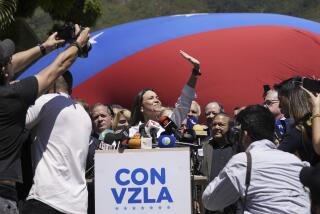No end in sight for Thai crisis
BANGKOK, THAILAND — With a deepening political crisis draining millions of dollars from the economy by the hour, government opponents hope a court can break a deadlock that politicians, police and the military have failed to resolve.
But the court ruling they seek may be cause only for more turmoil.
The Constitutional Court is expected to rule as early as Tuesday whether three parties in Prime Minister Somchai Wongsawat’s coalition, including his own People Power Party, should be dissolved for alleged electoral fraud.
A ruling against the government and its allies, which would be welcomed by demonstrators who have seized two major airports to press for Somchai’s ouster, is likely to provoke counter-protests from his supporters.
Pro-government leaders, who call their movement the Democratic Alliance Against Dictatorship, suggested at a rally Sunday that the court was conspiring with the opposition by moving up the date for a ruling. They have threatened to drive the opposition from the airports if police fail to do so.
Many Thais, who don’t fall into either the yellow-shirted opposition alliance or the red-shirted camp backing Somchai’s government, suffer through their country’s continued political instability.
For months now, each apparent solution has ushered in a new crisis, and more bloodshed. Grenade attacks on anti-government demonstrators are almost a daily event, and tensions are growing as rival camps threaten to assault each other and rumors of an impending coup spread.
The demonstrators regard Somchai as a puppet of former Prime Minister Thaksin Shinawatra, his brother-in-law. Thaksin was overthrown in a coup in 2006, fled overseas and was sentenced in absentia to two years in prison on corruption charges. The opposition says the National Assembly put Somchai in office in September at Thaksin’s bidding.
Somchai is trying to govern from the northern city of Chiang Mai, about 400 miles from Bangkok, the capital, and his spokesman suggested early in the crisis that he was staying there because he fears for his safety.
The army’s commander said last week that he would not lead a coup to oust Somchai because it was unlikely to solve the political stalemate. But as the economic damage mounts -- the airport standoffs are costing the country $57 million to $85 million a day, according to the Federation of Thai Industries -- so does pressure from some quarters on the military to intervene.
Bangkok’s 2-year-old, $3.8-billion Suvarnabhumi Airport has been shut down since Tuesday night, when thousands of protesters seized the buildings from police who put up little resistance. Two days later, demonstrators shut down the capital’s older, domestic Don Muang airport as well.
Tens of thousands of travelers stranded in Thailand by the airport standoffs continued their slow, frustrating exodus Sunday from Utapao International Airport, about 100 miles south of Bangkok, which normally handles a small number of flights from two Thai airlines and charters bring vacationers to the nearby resort city of Pattaya.
Officials say 88 aircraft, from numerous foreign and Thai airlines, are stuck at Suvarnabhumi. Some of the thousands of tourists who were in the airport’s departure lounge when protesters surged through police lines Tuesday have been holed up in hotels, angrily awaiting flights out.
Sunday, as a crush of tourists tried to leave from Utapao, many of whom had to camp out for at least a night, several thousand new visitors arrived on incoming flights. They streamed into the small terminal past scores of Muslims, many of them veiled women, who were napping, eating and chatting on the floor, desperate to fly out in time to reach Mecca, Saudi Arabia, for the annual hajj pilgrimage.
Teams of immigration officers worked from a few office desks set up to handle the extra load. Travelers crowded around a single luggage belt searching for their suitcases as colored lights winked on a small, artificial Christmas tree apparently intended to add some holiday cheer.
The airport is on a naval base, from which U.S. Air Force B-52 bombers launched airstrikes during the Vietnam War.
At midday Sunday, dozens of Thai troops dozed in the shade of trees at the base’s main gate, their assault rifles and helmets strewn about on the grass as hundreds of taxis, double-decker tour buses and other vehicles choked the two-lane road into the airport, inching toward the terminal.
At least 20 commercial airliners lined the tarmac. Most aircraft, including two 747s, belonged to the country’s biggest passenger airline, Thai Airways International. But jets from several foreign carriers were present, including those from Malaysia Airlines, Oman Air, Russia’s Aeroflot and Taiwan’s EVA Air.
A FedEx jet was the lone foreign cargo plane, not enough to make a noticeable dent in the millions of dollars’ worth of perishable and other export goods that are piling up in freight warehouses, waiting for flights out.
--
More to Read
Sign up for Essential California
The most important California stories and recommendations in your inbox every morning.
You may occasionally receive promotional content from the Los Angeles Times.









